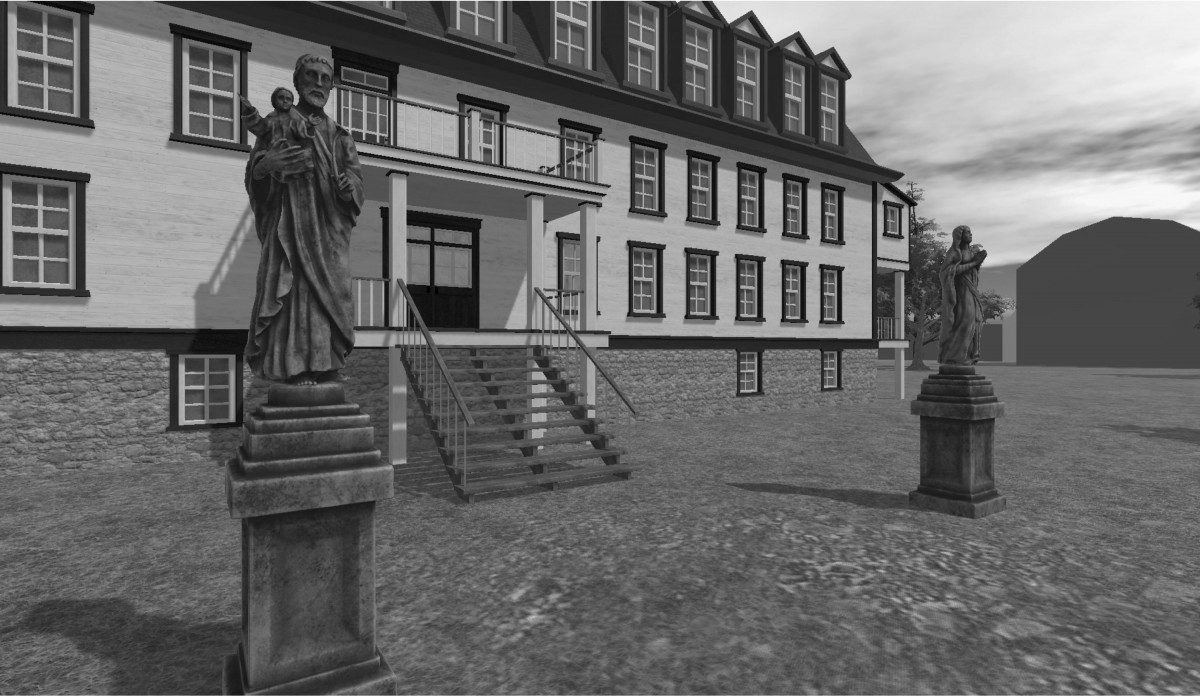
Launch of a virtual reality Canadian Residential School
A three-dimensional 'storyworld'
A virtual-reality Canadian Indian Residential School (IRS) debuted at a special event for Survivors and their families at St. Paul’s College on the University of Manitoba’s Fort Garry campus.
Embodying Empathy is a three-dimensional “storyworld” that immerses users in the experiences of Indigenous students who attended Indian Residential Schools. The project is based on the Fort Alexander Indian Residential School that operated from 1906 to 1970 on the Sagkeeng First Nation near Powerview, Manitoba. These experiences – of dislocation from family, arrival at school, and subjection to an alien and brutal new environment and way of life – profoundly affected IRS students in ways that continue to be felt by Survivors and their descendants across Canada today. The project is the result of more than four years of collaboration between IRS survivors, scholars, and technology professionals.
 “Virtual reality is a powerful tool to support public education and especially to reach young people, ” said Theodore Fontaine, a member of the Survivor Governing Council for the project. “People still do not understand the real story of Residential Schools and their destructive effects. This project shows why it has been a lifelong struggle not only to ‘get over it’ but to find a level of inner peace, and to seek some semblance of forgiveness.”
“Virtual reality is a powerful tool to support public education and especially to reach young people, ” said Theodore Fontaine, a member of the Survivor Governing Council for the project. “People still do not understand the real story of Residential Schools and their destructive effects. This project shows why it has been a lifelong struggle not only to ‘get over it’ but to find a level of inner peace, and to seek some semblance of forgiveness.”
The 2015 final report of the Truth and Reconciliation Commission of Canada concluded that Residential Schools were complicit in cultural genocide. Embodying Empathy uses emerging digital technologies to enable students and viewers to experience in a personal and meaningful way aspects of this genocide that might otherwise remain hidden since they are too intense, personal, or abstract to represent using conventional media. It also explores the power of digital media to recreate sites like the Fort Alexander IRS that have been destroyed or significantly altered, and which therefore can no longer be visited in real life.
The project has been guided by a governing council comprised of Survivors of Manitoba Residential Schools and led by Fontaine, a former Fort Alexander student and IRS memoirist. Embodying Empathy was funded by the Social Sciences and Humanities Research Council of Canada and involved partnerships with the National Centre for Truth and Reconciliation as well as Indigenous heritage agencies such as Legacy of Hope and the Shingwauk Residential Schools Centre. The Embodying Empathy team is contributing not just to Canadians’ understanding of students’ IRS experiences but also to scholarly and curatorial debates over the power of digital media to enhance the empathetic power of museums, archives, and other sites of conscience.
The virtual IRS is undergoing a lab evaluation in a social psychology lab to test whether or not it achieves its intended purpose, through feedback from approximately 800 psychology students over the next few months.
Following that evaluation, the team will look at bringing it to some high schools, and will also look at making a 2-D version available online.
In the future, they also hope to make it available to experience in a museum and gallery.







Fort Alexander IRS former student would like to see…Link please